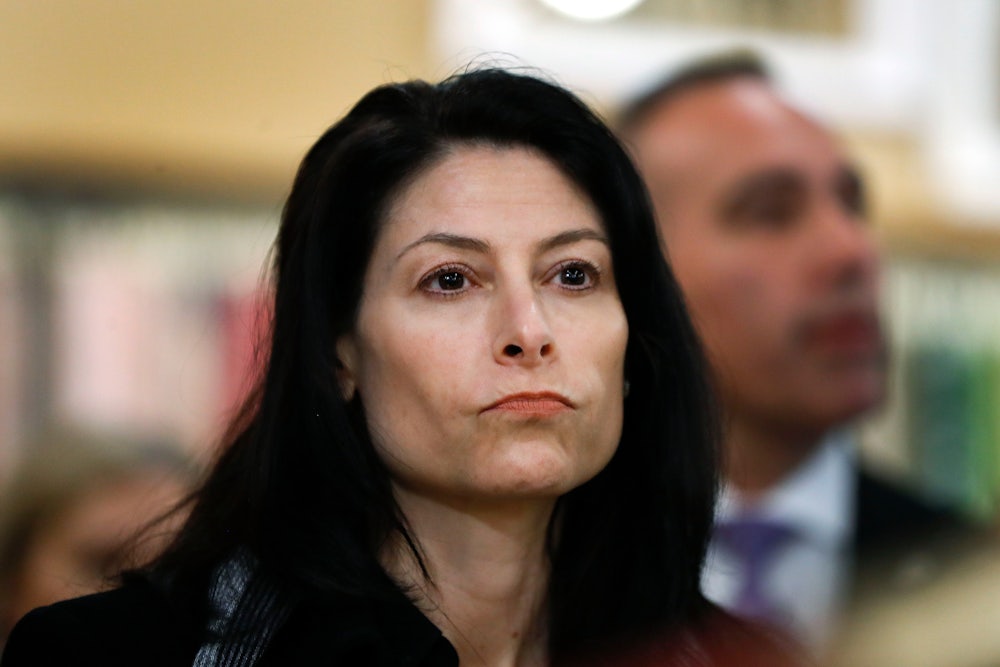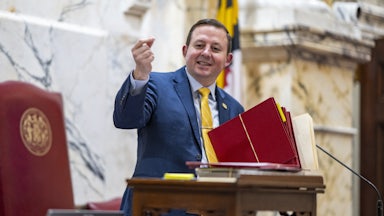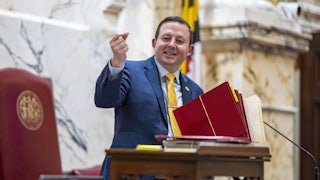Ever since the Supreme Court’s draft opinion overturning Roe v. Wade surfaced, Democrats have been grappling with the fact that the worst-case scenario may very well be nigh. The emerging argument has been that if the law is overturned, governors and state attorneys general will become even more crucial as defenders of abortion rights across the country. That’s the rationale behind a new push the Democratic Attorneys General Association, or DAGA, is rolling out Friday, according to a memo obtained first by The New Republic.
The memo to donors, Democratic allies, and supporters announces that the umbrella group for attorneys general is increasing its spending budget for paid media and services to between $25 to $30 million “in support of incumbent Democratic AGs and DAGA-backed candidates in battleground states like Georgia, Arizona, and others to come.”
By comparison, in the 2018 campaign cycle, DAGA’s “record-breaking” fundraising was $16.3 million. In other words, the new spending plan represents a nearly 40 percent increase in spending on races that are often overlooked by voters locally and nationally. Attorneys general races get substantially less attention and money than other statewide races like gubernatorial or Senate elections. But attorneys general, usually the top state law enforcement official, play important roles in deciding what kinds of policies a state government will defend or attack. That includes on topics like abortion.
DAGA is the only campaign committee that also has a “pro-choice litmus test” for its candidates. In other words, according to the memo, “endorsed Attorneys General and candidates must publicly support abortion access and reproductive health care” to have the organization’s support.
The memo gets specific about how having a Democratic attorney general can make a concrete difference in terms of abortion rights. It details how, for example, Michigan Attorney General Dana Nessel, alongside prosecutors in eight Michigan counties, has already said she would not enforce a 1931 ban on abortion. In Wisconsin, Attorney General Josh Kaul, up for reelection this year, has said the Wisconsin Department of Justice “will not be using its resources to investigate or prosecute alleged violations of the state’s 19th century abortion ban, which could take hold if Roe is overturned this summer.”
Nessel will face Republican attorney Matt DePerno in the general election. DePerno has pledged to prosecute women who seek abortions and their doctors, with no exceptions. DePerno has been endorsed by Donald Trump.* The Republican picture in Wisconsin is less clear.
There has been a heightened attention in recent years to secretary of state races and attorney general races. The prospect of Roe being overturned will only exacerbate that. Yet it’s unclear whether that will be enough to galvanize Democrats sufficiently to prevent what looks to be a wave election for Republicans at every level. Early indications are that the threat of Roe being overturned may not have fully settled in with voters yet, at least when it comes to fundraising.
The DAGA memo makes clear that it will need more money to adequately defend some of its pro-choice candidates across the country. “This will require a significant commitment and investment by national donors and organizations to fund state AG races in an unprecedented way that recognizes the national emergency on abortion,” the memo says.
Within the Democratic strategist and consulting community, a separate memo by strategist Molly Murphy of Impact Research, also obtained by TNR, has been circulating this week arguing that there’s a disconnect between national opposition to overturning Roe v. Wade and the sense of urgency voters feel about the high court actually doing it.
“A strong majority of voters oppose overturning Roe vs. Wade with polling consistently putting opposition over 60% nationally,” the Impact Research memo read. “Research throughout this cycle has demonstrated that attacks against Republicans on abortion are powerful, often testing stronger than any other attack. Despite this, voters have been skeptical that the Court would overturn Roe vs. Wade and did not believe Republicans wanted to come for abortions.”
That memo goes on to recommend that Democrats make clear that the upcoming elections “will now determine whether a woman can have an abortion where they live—the Supreme Court decision means that each state will now be allowed to criminalize abortion and ban it even in cases of rape, incest, and life of the mother.”
Democrats are hopeful that the possibility of Roe being overturned will jolt their voters into action. Senator Gary Peters, the chairman of the Democratic Senatorial Campaign Committee, told Axios that abortion would act as “a new energizing factor now that it’s no longer abstract; it’s very real.”
Elsewhere in the Senate, Majority Leader Chuck Schumer announced on Thursday that the Senate would vote next Wednesday on a bill that would codify Roe into law. The fate of that bill, though, is gloomy. It is essentially impossible that it will get the 60 votes needed to overcome a Republican filibuster and advance further.
Republicans are having to recalibrate as well. Congresswoman Elise Stefanik, a member of House Republican leadership who is focused on messaging, laid out in a memo on Tuesday how Republicans should and should not address abortion, in light of the SCOTUS draft.
Overall, the earliest moves by Congress in response to the draft ruling’s emergence have been mostly symbolic or message-focused. For lawmakers at the state level like attorneys general, though, the actions available to them if Roe is thrown out are more direct and clear. The challenge is for them to identify their offices so closely with abortion rights that they can make them a voting issue.
* This story originally misidentified Dana Nessel’s opponent.










